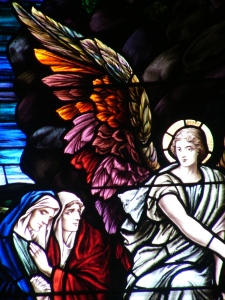This is the penultimate post in our series on the 1689 Baptist Confession of Faith. I hope and trust that you have benefited from looking at doctrines in Scripture thematically and systematically.

Benjamin Franklin is credited with the now famous assertion that in this world nothing can be said to be certain, except death and taxes. It is to death that the Confession now turns its attention. There are three groups of people that the Confession addresses.
Everyone
The Confession agrees with Franklin that death is a certainty for everyone – there is no exception. Everyone’s final destination on this earth is death (if the Lord does not return). What is the state of man in this certainty? To begin with our bodies return to dust. From dust they came, and to dust they return (Gen. 3:19). Even the greatest Israelite King, David, saw corruption and decay (Acts 13:36). However, we are not only physical bodies, but also eternal souls. And so, our “souls, which neither die nor sleep, having an immortal subsistence, immediately return to God who gave them” (pg. 120; Ecc. 12:7). The implication here is that there is something beyond the grave, of which we are conscious. It is at this point that we must consider the second group of people.
The Righteous
Everyone’s bodies return to dust, and all their souls return to God, but everyone does not enjoy the same treatment. The righteous (or Christians, believers in Christ) are immediately received into Paradise (Luke 23:43; Phil. 1:23). It is here that the righteous await their full redemption at the end of time.
Of course, the reality is that there will still be people living when the end of time arrives. These people will not experience death per se, but they will experience resurrection. Scripture clearly teaches that these people will be caught up into the air and changed in the blinking of an eye (1 Cor. 15:51-52; 1 Thess. 4:17).
For the righteous who have experienced death, at the end of time they will enjoy having their souls reunited with their resurrected bodies (1 Cor. 15:42ff.). In this we will be raised to be made like Christ (Jn. 5:28-29; Acts 24:15; 1 Jn. 3:2). This is the glory which awaits the righteous in death and resurrection.
The Unrighteous
Sadly, there is a third group of people – the unrighteous. These people have spurned Christ and his love throughout their life, and so face a very different experience on the other side of death. As mentioned above their souls return to God, but not to be welcomed into Paradise. Instead, these individuals are cast into a place of suffering and torment until the final judgement which will occur at the end of time (Luke 16:23-24; 1 Pet. 3:19; Jude 6-7).
At the end of time, however, the unrighteous will be brought before God again and will be judged for their rebellion and hatred against God (Jn. 5:28-29; Acts 24:15).
Conclusion
I want to conclude with three implications for what I assume will be a Christian readership:
- First, we should note the great comfort that Scripture affords the Christian in death. While we will suffer death like everyone else – and for some that will be painful, undignified and brutal – we will not enter some strange abyss. To be absent from the body, to die, is to be with the Lord. For those who have lost loved ones in Christ this is a great comfort as we know they are now present with God. As the Confession reminds us they “behold the face of God in light and glory” (pg. 120). For those perhaps facing death and their final days, know this: when you close our eyes for the final time God will be the next person you see!
- Second, we must think again what heaven (or to be more accurate the new heaven and new earth) will be like. This is somewhat difficult as Scripture uses lofty imagery to describe the indescribable, but so often our ideas are mistaken (and badly informed by media). In resurrection we will be given back our bodies, only they will be glorified. We will be perfect representations of Jesus Christ. We will experience what Adam and Eve enjoyed all too briefly. We will not have some bodiless, floating experience.
- Third, can we really it back in our comfortable churches and not cry out to the world in darkness about the dangers that lie ahead of them? To die, to be raised, to be put in a ‘holding cell’, to be brought before God, to be judged and condemned eternally is a frightful prospect. We alone hold the remedy to that in the gospel of Jesus Christ – and thus, we must proclaim it! Again there is comfort to be found here, because it is never too late to trust in Christ while there is breath in your lungs. After all, Jesus promised the thief on the cross that that very day he would be with him in Paradise!




